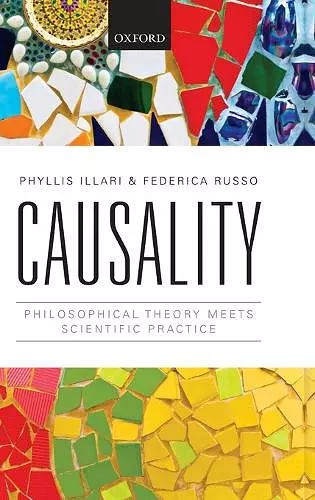Causality
Philosophical Theory meets Scientific Practice
Federica Russo author Phyllis Illari author
Format:Hardback
Publisher:Oxford University Press
Published:2nd Oct '14
Currently unavailable, and unfortunately no date known when it will be back

Head hits cause brain damage - but not always. Should we ban sport to protect athletes? Exposure to electromagnetic fields is strongly associated with cancer development - does that mean exposure causes cancer? Should we encourage old fashioned communication instead of mobile phones to reduce cancer rates? According to popular wisdom, the Mediterranean diet keeps you healthy. Is this belief scientifically sound? Should public health bodies encourage consumption of fresh fruit and vegetables? Severe financial constraints on research and public policy, media pressure, and public anxiety make such questions of immense current concern not just to philosophers but to scientists, governments, public bodies, and the general public. In the last decade there has been an explosion of theorizing about causality in philosophy, and also in the sciences. This literature is both fascinating and important, but it is involved and highly technical. This makes it inaccessible to many who would like to use it, philosophers and scientists alike. This book is an introduction to philosophy of causality - one that is highly accessible: to scientists unacquainted with philosophy, to philosophers unacquainted with science, and to anyone else lost in the labyrinth of philosophical theories of causality. It presents key philosophical accounts, concepts and methods, using examples from the sciences to show how to apply philosophical debates to scientific problems.
Causality is a hot topic in philosophy of science. Illari (lecturer, University College London) and Russo (researcher, Univ. of Ferrara, Italy) provide a much-needed travel guide through this landscape while sticking close to actual scientific practice from both the natural and social sciences. ... Highly recommended. * Choice *
This is also one of those wonderful, concise tomes that sports a very good bibliography, and makes no bones about sending the reader to one of the works there for more details about specific topics. I found no topic that was poorly explained in the main text but, as the authors [themselves say, "[we] offer a map, not an encyclopedia." Illari and Russo very deftly point out the major attractions of the landscape but send you, well-prepared now to find your own way, to the library for more. * Glenn Becker, Mathematical Association of America Reviews *
The book is an excellent resource, well written and referenced, and a sheer pleasure to read. The authors' two main goals are to offer an introduction to the philosophy of causality and to be highly accessible. They have clearly achieved both goals. I recommend the text to medical and epidemiology students, fellow epidemiologists, and physicians unfamiliar with the philosophy of causality. * Olaf Dammann, Theoretical Medicine and Bioethics *
the book covers an impressively wide range of interrelated topics in the philosophy of causation and their application to the natural sciences, and with a prose highly readable, often entertaining, and sprinkled with interesting, relevant, and illustrative historical anecdotes. For these reasons alone, it is easy to recommend this book to interested colleagues in either discipline: a highly accessible and candid treatment of this complex topic which sacrifices neither breadth nor depth no doubt deserves the attention of both parties. * Christopher J. Austin, Metascience *
ISBN: 9780199662678
Dimensions: 241mm x 158mm x 23mm
Weight: 588g
328 pages